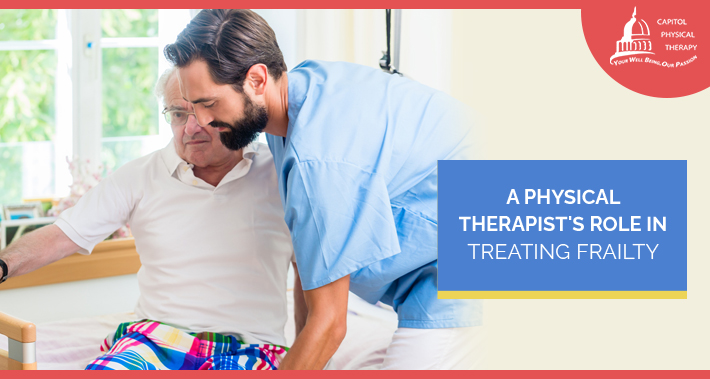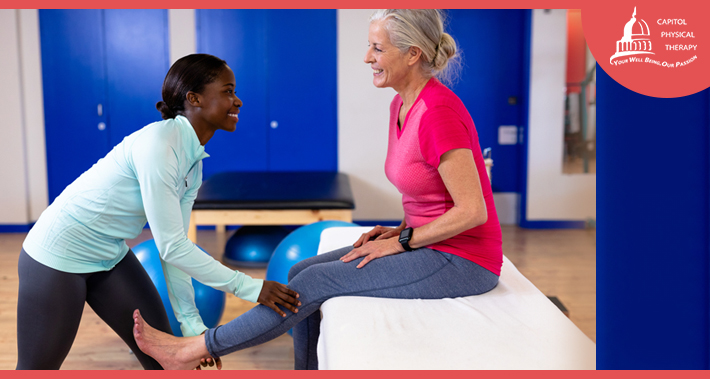
Are you nervous that some of the symptoms you’ve been experiencing lately might indicate you are developing frailty?
Frailty can affect many different areas of your life, making the everyday tasks you used to do more challenging for you to complete.
If you know you have this condition, you’re probably wondering if there’s anything you can do to get some relief from your symptoms.
Don’t worry, there’s help for you.
If you’re looking to find physical therapy for seniors, we’re Capitol Physical Therapy in Washington DC and we’re here to help.
In particular, we offer vestibular rehabilitation physical therapist near me services that can help.
No matter what your physical challenges are, we’re here to help you navigate your life with frailty.
Keep reading to find out more about what frailty is and how physical therapy can help.
What Is Frailty?
Frailty is when multiple body systems become less effective at their jobs over time.
This can present as a number of different symptoms, which we’ll look at shortly.
If you’re affected by frailty you might have trouble with everyday tasks like dressing, grooming, toileting, eating, preparing meals, cleaning, cooking, driving, and shopping.
Your muscles may become weaker and your heart and lungs can begin to lose the capacity to support you.
Ultimately frailty is a culmination of multiple systems in your body beginning to decline.
It means your ability to overcome minor stressors and challenges in your everyday life will be reduced and you may take longer to recover from them.
This can lead to being more prone to injury as well.
RELATED: Fall Prevention Physical Therapist Near Me
What Are The Signs Of Frailty?
There are a number of different symptoms that can point to frailty.
Because it involves multiple systems in your body, it can be difficult to pinpoint without professional help.
Keep an eye out for the following signs:
- General feeling of weakness
- Loss of muscle mass
- Trouble getting up without help (from chairs or bed)
- Exhaustion and lack of energy
- Reduced ability to tolerate physical activity
- Loss of strength
- Severe fatigue
- Weight loss
- General decreased mobility
- Poor balance
- Trouble standing or walking
- Trouble sitting
- Difficulty getting in and out of bed without help
- Difficulty moving around while in bed
- Loss of ability to keep up with household tasks
- Increased fear of falling
- Difficulty socializing
- Feeling unable to work
Is Frailty An Inevitable Part Of Aging?
Frailty can be developed at any age due to certain circumstances like chronic pain, disease, or traumatic injury.
If by midlife you have more than one chronic condition, your risk of frailty increases.
However, the most important factor with frailty is lifestyle.
Staying active is one of the best ways to reduce your risk of frailty.
RELATED: The Health Benefits Of Running
Frailty can get worse as time goes on if it is not addressed.
That said, frailty is not an inevitable part of aging.
Some research even suggests that frailty can be reversed or delayed through exercise.
How Can Physical Therapy For Frailty Help?
If you’re living with frailty, a physical therapist can help you navigate it.
Physical therapy will focus on managing your activity levels.
With a plan customized for your unique needs, physical therapy can help you get you back to the activities you used to enjoy.
They’ll focus on these key areas during your physical therapy:
1. Chronic Pain Management
If you have persistent pain from your frailty, physical therapy can help.
In particular, your physical therapist can target the different areas of your body where you’re feeling pain, including:
Frailty can make you feel vulnerable, so you may feel a little nervous when you’re getting started, but don’t worry – your physical therapist will make sure your exercises are safe for you.
2. Preserving And Improving Strength
Your physical strength may feel like it’s fading if you have frailty.
This may make it feel like certain tasks are more difficult than they used to be.
If this is the case, your physical therapist can help you preserve the strength you still have and rebuild what you’ve lost.

3. Preserving And Improving Endurance
Aerobic endurance can be one of the first things to go when you develop frailty.
Aerobic endurance targets your heart and lungs.
Through specific prescribed exercises, your physical therapist will help you rebuild your endurance.
This can help you return to your previous activities.
4. Preserving And Improving Motion
Restoring movement might be one of the most intimidating parts of physical therapy for you.
After all, your first instinct when you experience frailty might be to reduce the amount you move.
But it’s important to keep moving as much as you’re able.
Your physical therapist will start you slow with passive motions, meaning your therapist will gently move your body parts for you.
This can help you get your body used to those movements once again.
Once you’ve adapted to these new motions, they can introduce exercises you can do on your own.
5. Maintaining Good Balance And Posture
You’ve probably heard that you want to have a good sense of balance so that you decrease your risk of falling.
Your physical therapist will be able to go over fall prevention strategies with you.
This will include exercises that will help you even if you do fall, so you know how to recover quickly from it.
6. Other Approaches
Your physical therapist can also take a look at your flexibility.
People with frailty often have muscles that are very tight, so a focus on getting more can help increase movement and decrease pain.
They’ll also be able to come up with goals for activities with you, and give you tips for modifying your home to be safer for you as you navigate frailty.
Book Your Appointment With Capitol Physical Therapy Today
You do not have to live with limitations or pain just because you start to notice the signs of frailty.
Does it sound like you’d benefit from physical therapy to help you with your frailty?
We know it can be intimidating to come to physical therapy when you are not feeling at your best, but we’re here to help.
Don’t wait, book your appointment with Capitol Physical Therapy today to get started.
1331 H St NW #200,
Washington, DC 20005
- https://g.page/capitolptdc
9560 Pennsylvania Ave. # 202,
Upper Marlboro, MD 20772
- https://goo.gl/maps/zjL4NnnuThRhrcS86
Capitol Physical Therapy offers orthopedic and other pain related solutions, with our versitile team of physical therapists in Washington, DC